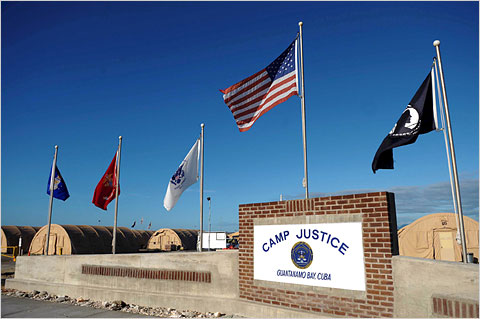
This assignment was supposed to fulfill a career-long dream. In the ten years I have been employed by Amnesty International USA in research, the opportunity to travel to Guantánamo Bay, Cuba to observe military commission proceedings against the detainees charged with leading involvement in the September 11th terrorist attacks was something I always wanted to experience firsthand.
I flew down to this US Naval station on the southeast edge of Cuba and I arrived Sunday evening just in time to gain my first experience of the ever-changing world of military commission justice when the press briefing rules were amended at the last minute to prevent observers from attending the opening press briefing by the defense and prosecution counsels.
As a human rights researcher, I somewhat knew what to expect. However as an attorney, this morning threw me a relative curveball, even from a military commission process which is now in its third incarnation with multiple legal challenges and stoppages in the past 12 years. Even though I am used to the ups and downs of trial observation, as Monday’s proceedings began I could feel my anticipation growing while seated in the gallery. I would not say “courtroom” since the physical courtroom is separated from us by a thick glass window while we watch what is happening before us on a television set to a 40-second time delay, with members of the armed services watching us in the gallery on one side while others watch the aptly named “permanent residents” of the island, such as Khalid Shaikh Mohammad, on the other.
The proceedings began promptly at 9:00 am. In terms of starting on time, if anything, military justice on Guantánamo is a more efficient process than what I’ve seen on the US mainland… and the arguments on a motion by the defense moved fast and furious. An attorney for Walid bin Attash and the military judge began with a repartee about the quality of the food at the Galley on the base, with other members of the defense and prosecution weighing in with such descriptions as “terrible” to “great” to “excellent”. Two out of three attorneys approve — the military chefs would have been proud.
This culinary discussion was interrupted by the defense attorneys’ arguments that their attorney-client privileges and confidentiality were at issue because the 27 microphones in the courtroom were picking up and recording their private, side conversations while the areas in Camp Echo that are used for attorney-client meetings were potentially being eavesdropped by some other governmental agency(ies). After 70 minutes, the judge granted the defense motion for a recess until tomorrow morning.
My time spent viewing the unrestricted areas of the base on Sunday when I could view from afar the detention camp where the remaining Uighur detainees are still held, and attending a hearing which lasted 70 minutes, only serve to remind me of the obvious. This is not justice. This military commission system is no way to lawfully and fairly try the individuals responsible for any crime, let alone 9/11. And it is galling to consider that from day one, the ordinary US federal courts, with the capacity and experience to prosecute terrorism cases, have been available and open for business…
I suppose it could be said that at least these defendants have pre-trial hearings to break up the monotony of their detention. Unlike others, like Shaker Aamer, who sits in his cell, stranded in limbo, a “permanent resident” who has long been “approved for transfer” by the US authorities but is today approaching his 11th anniversary in detention at Guantánamo.
Enough is enough. What I have seen on this trip so far only serves to reconfirm my belief in the calls of Amnesty International: End the detentions lawfully. Try those who can be charged for crimes recognized under international law in proceedings that meet fair trial standards in the United States. Release those who cannot be charged to countries that will respect their human rights or into the USA. And close this detention facility once and for all.
That place needs to shut down! There is no other way of dealing with things there because they are so out of control that it's too late to try to bring some remedies.
This is place is a shame in the face of the US, they should put it down.